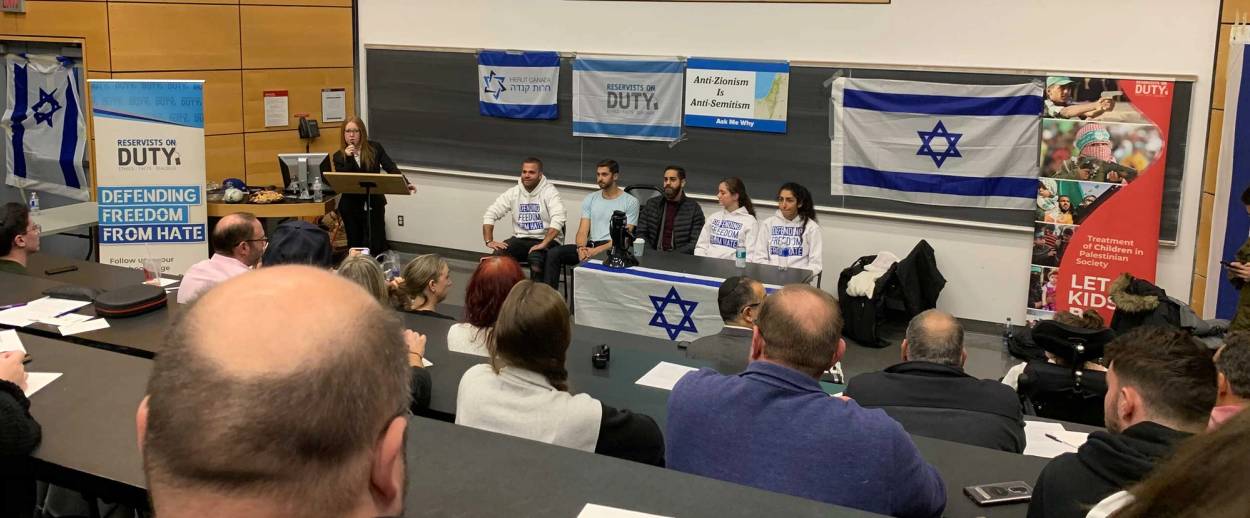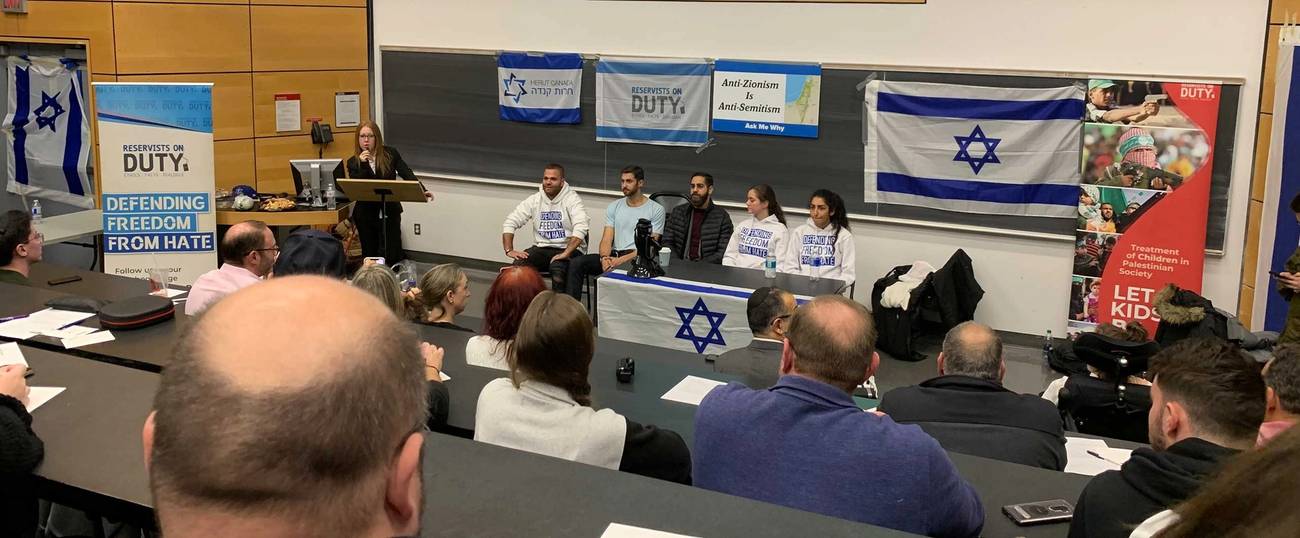Campus Anti-Zionism Seen Through the Eyes of a Syrian Refugee
I was about to find out that Canadian students at a top school like York University could hold protests just as serious and menacing as those I had seen in the Middle East




A refugee from a war-torn country is used to seeing all parts of their homeland become a battleground. Streets. Apartments. Football fields. Even the historic Krak de Chaveliers castle near my native Homs in Syria was fought over by opposing sides in the Syrian civil war. After landing in Canada, however, I hadn’t expected my new country’s universities to be arenas for ideological mobs to shout down and denounce their opponents.
When I made my way up to York University this month on the evening of the 20th, I was blissfully unaware of the university’s status as a hotbed of “anti-Zionist” activism.” I had only arrived in Canada in two years ago through the Refugee Resettlement Program and, still eager to explore, was taking my first trip up to York. I planned to attend an event being held by Herut Canada, who were hosting five members of the Israeli NGO “Reservists on Duty” an organization of Israeli military veterans who travel the world and hold talks and events to “counter the BDS movement and new forms of anti-Semitism erupting on US college campuses.”
I was looking forward to meeting with the Israeli veterans. Such meetings were frowned upon back in Syria—as in, land one in jail kind of frowned upon. Canada was the one truly safe place I had ever lived where a Syrian might meet Israelis without suffering any consequences.
Poor, naïve me.
As I soon learned, York University in Toronto has for some time earned its reputation as a place that is hostile to people holding Zionist and pro-Israeli political standings. A mural currently exhibited at the York University Student Centre garnered headlines for its depiction of a Palestinian with his back turned, face covered in a kafiya, a map of “Palestine” completely erasing Israel, clutching two rocks behind his back while gazing at a construction site. One does not have to be Jewish or Israeli to consider it a menacing piece.
Such sentiments may not be unique to York. Earlier in the week at another of the city’s major academic institutions, the University of Toronto, an official in the Graduate Student Union rejected a request from Hillel to support bringing more kosher food onto the campus, on the grounds that it would be taken as pro-Israel and might run contrary to the “will of the membership,” who had voted to support the BDS movement against Israel.
Back at York, in October Lauren Isaacs, a student at the school and director of the Toronto chapter of Herut Canada, an organization that describes itself as “a Zionist movement dedicated to social justice, the unity of the Jewish people and the territorial integrity of the Land of Israel”, set up an exhibition at York with a sign saying “I’m a Zionist, ask me why.” The reaction from some students was pure, unadulterated rage. Lauren has described on her Facebook page how she was insulted, spat on, called a Zionist-Nazi.
When I arrived at the campus Wednesday night, York’s Vari Hall appeared like what I imagined any Canadian faculty building to look like, with students lounging about with their laptops and headsets. Someone was dancing quite expertly to the sounds of a stereo player.
I decided, with time to kill before listening to speakers that the Syrian Mukhabarat would have had my neck just for meeting, that I would explore the student cafeteria. My refined Middle Eastern palate was unimpressed by the offerings available to the unfortunate York students at the cafeteria, although I did find the diversity of the student body quite impressive.
That was the last moment I would have any positive feelings toward York University. On a wall, I spied a poster, announcing a protest to be held 10 minutes hence, against the very event I had come to attend. I was about to find out that Canadian students could hold protests just as serious and menacing as those I had seen in the Middle East. Apparently, it wasn’t just in Syria that the presence of a pro-Israel event was looked on as the ultimate abomination.
Making my way back to Vari Hall, I saw a small group of protesters already gathered at one end of the cafeteria, holding aloft a Palestinian flag. Ten minutes later, with the first of “Free, free Palestine” slogans belted through loudspeakers, the crowd of pro-Palestinian demonstrators had swelled to hundreds, all making their way up into the hall and up the stairs toward the auditorium where the event was to be held.
At the top of the stairs, their progress was firmly blocked by two extremely large men, holding high Israeli flags, backed by a score of pro-Israel counterprotesters. Apparently, others had been better informed than me about what was planned for the evening. For the first time I saw the presence of Toronto city police personnel.
And there things stood, a stalemate between the two sides, the pro-Israeli group vastly outnumbered by their opponents, but the latter unable to advance due to the strength and size of the individuals opposite them. I had never, in a hundred years, thought I would be standing on the side of a protest waving Israeli flags, shouting “Am Israel Chai”, while being yelled and screamed at by a crowd holding up numerous Palestinian flags, and shouting pro-Palestinian slogans including chants of “viva viva Intifada”, in reference to the Palestinian uprisings which targeted both Israeli soldiers and hundreds of civilians.
At some point, the two sides got into a shoving match which I did not witness but the video of which was subsequently widely distributed online. At this time, the pro-Palestinian crowd decided it was best to withdraw down the stairs.
It would prove to be a temporary withdrawal. The most heated part of the evening was yet to come.
As the event’s attendees entered the auditorium, papers with instructions were handed to each visitor. Questions would be written down, not spoken. No political banners or flags were allowed. The rules of the event required politeness and respect towards all.
Just minutes after the 7 p.m. start time, loud pro-Palestinian slogans were being shouted through speakerphones just outside the doors of the auditorium. The demonstrators had come back up the stairs where policemen prevented them from entering the room. Protesters had gotten to the smaller locked side door and were banging on it. Someone ingeniously put up an Israeli flag on the door’s glass, a sort of middle finger to the loud disturbance outside.
It wasn’t just outside the auditorium that the anti-Israel crowd was making its presence felt. Several times during the event, people got up and loudly disrupted the talk, waving Palestinian flags and pictures. They were escorted out by the security inside the room to a hero’s welcome outside.
When it came time for the attendees to write down their questions, I made sure that mine indicated I was a former Syrian refugee, who was happy to meet the reservists, and my presence at the event was in gratitude to all the IDF had done for Syrian refugees in the Golan. More of a statement than a question, but it would be one of the few that would be read out, before the questions and answers were interrupted by a lady who had originally lived in the Soviet Union.
She recalled her struggles living under the KGB and compared the atmosphere of intimidation and hatred going on outside the doors with her life back then. That opened a flood of complaints and opinions from the attendees—on the negligence of the university’s administration in letting the demonstrators get close enough to disrupt the event, and how as Jews they now felt unsafe and unwelcome in Toronto, their own city and home. One person pointed out with much justification, that if it had been a Muslim event being besieged by white supremacists, the riot police would have been called in.
As it was, later reports indicated it took more than 10 police officers and private security to keep the protesters outside of the event—a considerable security presence in anyone’s book.
At the end of the event, the attendees were informed that for their own security, anyone going back to the parking lot should be escorted in a group under police protection.
Prudent, perhaps, but to me it seemed too much. By this time the protesters had been persuaded to move down to the ground floor. I went out of the event the same way I had come in, through the front doors of Vari Hall and right past the pro-Palestinian crowd that had moved to just outside the hall. In Syria I had protested a few hundred meters away from where Syrian soldiers were barricaded, and I had learnt something about thuggery; its participants are brave only when they outnumber their opponents, and no authority would check their excesses. That night, it seemed the ones waving Palestinian flags were not unduly concerned with what the administration of York University would think of their harassment and disruption of a university-sanctioned event on campus.
Later that week, the Arabic Language Canadian newspaper Meshwar gleefully recounted the events of the night, saying that the pro-Zionist event had been “besieged” by hundreds of protesters, and the auditorium had been half empty. In contrast, B’nai Brith put out a statement lauding the fact that the event had been held even in the face of massive efforts at disruption and intimidation.
Maybe so. Maybe the demonstrators and their own supporters had considered the night’s events to have been a triumph. As someone from the region, I couldn’t help but remember that during the Syrian revolution, every time the regime suffered a political or military setback, out came the flags, banners, posters and TV cameras to film the “patriotic” masses shouting their slogans and affirming their love to the motherland. Only weak regimes feel the need for mass demonstrations.
As they once did in Damascus and Aleppo, apparently, so they do at York University.
***
Like this article? Sign up for our Daily Digest to get Tablet magazine’s new content in your inbox each morning.
Aboud Dandachi is a former Syrian refugee who arrived in Canada in 2017 through the Canadian Refugee Resettlement Program. He has been published, interviewed and cited on Syrian issues in numerous outlets, including the BBC, NPR and the Israeli and Turkish press and is the founder of Thank You Am Israel. Follow him on Twitter at @abouddandachi.